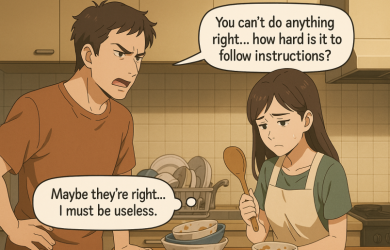How to Recognize an Emotionally Abusive Relationship?

Heal & Grow Daily for a Happier Relationship
Subscribe FREEKey Takeaways
Marriage.com AI Quick Summary
Emotional abuse can be more insidious and elusive than physical abuse.
That is why it is hard to detect an emotionally abusive relationship. But it does exist.
And it is just not just men who are the abusers. Research and statistics have shown that men and women abuse each other at equal rates.
This article elaborates on the characteristics of an emotionally abusive relationship and also expresses the signs of emotional abuse in a relationship.
Also watch:
Emotional abuse explained
Emotional abuse involves a regular pattern of threatening, bullying, criticism, and verbal offense. Other tactics used by the bully are intimidation, manipulation, and shaming.
This type of abuse is used to dominate and control the other person.
Quite often, the source of emotional abuse is due to the abuser’s childhood insecurities and wounds. Abusers themselves were sometimes abused. Abusers have not learned how to have positive, healthy relationships.
The victim of the abuse does not see the mistreatment as abusive – at first. They use denial and minimizing as coping mechanisms to deal with the stress of the abuse.
But denying emotional abuse year after year can result in anxiety, depression, and post-traumatic stress disorder. These are only a few symptoms of emotional abuse.
Related Reading: What Is Verbal Abuse: How to Recognize and Avoid Verbal Beatings
28 Signs of an emotionally abusive relationship
Sometimes people think that ‘abuse’ is not the right term to describe the mistreatment caused by their partners. They think it has more to do with the difficulties or problems that their partner has at the time.
Unfortunately, in some cases, this is just another form of denial.
If you want to learn if you are emotionally abused in your relationship, check for the following signs.
- Your partner demeans or disregards your opinions, ideas, suggestions, or needs – on a regular basis.
- Your partner blames you of things that you know to be untrue.
- Your partner humiliates you, puts you down, or makes fun of you in front of other people.
- Your partner uses sarcasm or other methods of teasing to put you down and make you feel bad about yourself.
- Your partner treats you like a child and tries to control you.
- Your partner tells you that you are too sensitive, in order to put the blame on you for his or her emotional abuse in marriage.
- Your partner always tries to chastise or correct your behavior.
- Your partner calls you names or gives you unpleasant labels.
- Your partner is distant or emotionally unavailable – most of the time.
- Your partner regularly points out your flaws or shortcomings.
- Your partner uses withdrawal to get attention or get what he or she wants.
- Your partner plays the victim with the goal of deflecting blame.
- Your partner does not show you any empathy or compassion.
- Your partner does not seem to care about or even notice your feelings.
- Your partner uses neglect or disengagement to punish you.
- Your partner sees you as an extension of him- or herself, instead of seeing you as an individual.
- Your partner belittles you and trivializes your accomplishments and dreams.
- Your partner withholds sex as a way to control and manipulate you into doing what they want.
- Your partner denies emotionally abusive behavior when you talk about it.
- Your partner tries to control how you spend your money.
- Your partner has trouble with apologizing or never apologize at all.
- Your partner cannot tolerate being laughed at.
- Your partner tries to make you feel like you are always wrong, and he or she is always right.
- Your partner makes negative remarks or subtle threats to frighten you and keep you under their control.
- Your partner is intolerant of the lack of respect.
- Your partner crosses your boundaries over and over again.
- Your partner makes you feel like you need his or her permission to make decisions.
- Your partner blames you for their unhappiness or other problems, instead of taking personal responsibility.
There are many more warning signs of an abusive relationship.
If the behavior of your partner is aimed at making you feel controlled, small, or incompetent, that is wrong and abusive.
If the behavior of your partner is making you feel dependent, and it is stopping you from being yourself, then that is also abuse. So no longer deny what is really happening.
Dealing with emotional abuse
Once you have identified the signs, you’re in an emotionally abusive relationship; you need to deal with that relationship until you leave it.
One of the best steps is to talk to someone about your abusive relationship. It is best to talk to someone who is outside of this relationship.
That person can help you see things from another perspective. This is especially valuable if you tend to see abusive behavior as innocent.
A fresh perspective would also help you visualize the long-term effects of being in an emotionally abusive relationship.
Only when you hear that it is not, can you change your mind and see the behavior for what it really is. An outsider can help you detect unreasonable behavior.
You must recognize that your compassion towards your partner won’t help you change him. Also, don’t retaliate as it only allows the abuser to manipulate you and put the blame on you.
Another aspect you must consider is to see a relationship counselor. He or she can help you untangle the situation and help both of you where the abusive behavior might come from.
The counselor can help both of you to move towards a more healthy relationship.
When it comes to leaving an abusive relationship, you can consider the following suggestions:
- Do not be scared to let go and know when to end the relationship.
- Ensure that you are not under any imminent physical danger.
- Make sure you always have your phone with you to prepare for an emergency.
- If you feel threatened, find a safe place to go to.
- Do not contact your abuser nor respond to their attempts to communicate.
- Again, seek professional help to work through the challenges.
No type of abuse is acceptable, physical, emotional, etc., look for the signs of emotional abuse in your relationship and recognize if your relationship is truly salvageable or is it time to leave that relationship.
Related Reading: 8 Ways to Stop Emotional Abuse in Marriage
Stuck in conflict and unsure how to move forward together?
 Tips
Tips
Write your tip or submit a video tip
All tips are reviewed before the publishing.
Share this article on
Recent Articles
Related Quizzes
Heal & Grow Daily for a Happier, Healthier Relationship
Subscribe FREE on YouTube We'd love your feedback!
We'd love your feedback!
 Expert Q&A
Expert Q&A
Ask your question related to this topic & get the support you deserve from experts.


 Reviewed by
Reviewed by
















 Thanks for your feedback!
Thanks for your feedback!